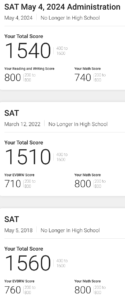It was just another “normal” Saturday morning for me. I woke up well before 6:30AM and headed to Conestoga High School to take the SAT with kids 30 years younger than me! I try to take the SAT and ACT (I am taking it this Saturday, June 13) at least once a year in order to recognize testing trends. In addition, with the SAT making major changes next year, taking the SAT gives me a sneak peak (via the unscored experimental section) at the format of the new questions. I also want kids and parents to know that I know my stuff (“I saw this question last week” resonates more strongly than “Back in 1986, the SAT asked me for the definition of ephemeral.”)
Well, the test and its aftermath were anything but normal. Students and parents nationwide (overseas, this was not a problem) remain worried about a major College Board error. On some test booklets, SAT section 8 listed a time limit of 25 minutes (instead of the actual time limit of 20 minutes). On some test booklets, it was section 9 that made the same error. Proctors were given a script and manual that indicated the correct 20 minute time limit). Fortunately in my testing classroom, the error was handled with relatively little fanfare.
In my case, the math section had the error. I distinctly remember looking up at the clock and the time limits written on the board. I thought to myself “Did I really just do 10 math questions in 2 minutes??” A couple minutes later, the proctor very subtly told the test takers that the time she wrote on the board was wrong and she shortened it by 5 minutes. I am so familiar with the test, that I don’t read the time limits in the booklet. Sections 8 and 9 are always 20 minute sections. However, it is completely understandable for a typical high schooler to not know the time limits off the top of his or her head. Nevertheless, no one made a peep about it in my classroom.
However, in test centers across the country, it was a different story. One of my students told me half of the students in her classroom had a Section 8 with 20 minutes, while others had a Section 8 with 25 minutes. Some students didn’t know there was a timing error until a proctor gave the 1-minute warning. Imagine being an already stressed out teenager who thought there were 6 minutes left, only to find out that there was only 1 minute left!!
Immediately, the chatter started. Will we have to take it again? Will the scores count? Can I afford to wait until October to take the SAT again? What if I am applying early decision?
Early this week, the College Board issued a press release and emailed all test takers (including me). The test will count, but the two sections where some students may have had 5 extra minutes will not count. So, the most common question my students and their parents have been asking is a variation of “what if my kid is good at math and they don’t count the math section?”
The answer is how the tests are being scored won’t make too big a difference. The College Board will not be scoring the two affected sections (8 and 9). So, every student who took the test in the US will have the shortest reading section and the shortest math section discarded. So, whether your child is better at math or not will not really matter. It’s not like math will be worth any less than it was before. For this test, the math score will be based on 38 questions (instead of the usual 54). The reading score will be based on 48 questions (instead of the usual 67). The standardized scores will still cover a 200 to 800 range for each section. The writing section was not affected at all.
But don’t just take my word for it. Here is the College Board Statement with FAQ.
That being said, a student’s section 8 may have had math questions with which he is more comfortable (more geometry vs. algebra). Perhaps, a student’s section 9 tested vocabulary words that she knew quite well versus the words used in previous reading sections. So, in some cases, students’ scores may slightly benefit or suffer from the College Board decision. In the end, all scores will be based on the same essay, the same 38 math questions, the same 48 reading questions and the same 49 writing questions.
But still, can someone proofread the SAT next time?!?
(And don’t get me started on reports from 2 different students of mine that they saw the exact same reading passage they saw earlier this year! It sounds like it was used in the experimental section both times.)

